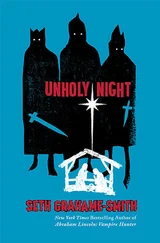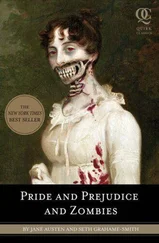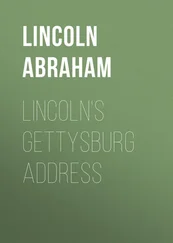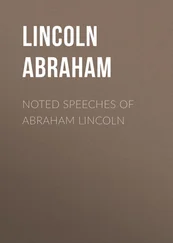By sunrise, Crowley had dragged most of his fellow settlers into the woods. He’d been left no alternative. Explaining a plague was easy. Almost as easy as explaining a man falling from a crow’s nest, or a girl jumping overboard, or a fisherman being attacked by savages. But screams in the night, followed by the disappearance of four men, a woman, and an infant? That he couldn’t explain. They would question him. Discover him. And that, he couldn’t have. One by one, he dragged their battered bodies away. Of his 112 fellow settlers, only one had been spared his wrath.
Crowley had hesitated to kill Virginia Dare. A baby that he had personally delivered? The first English soul born in the New World? These things had sentimental value. Besides, she would have no memory of what had happened here, and a young female companion might prove useful in the lonely years to come.
“He returned from the woods with the baby in his arms. I daresay he was surprised to see me alive—though barely so—struggling to keep my feet while I carved the letters ‘CRO’ into a tree with a knife. My dying effort to expose the identity of my murderer. Of my wife and child’s murderer. His shock subsided, Crowley could not help his laughter, for I had unwittingly given him a brilliant idea. Setting the baby down and taking my knife, he carved the word “Croatoan” onto a nearby post, all the while smiling at the thought of John White massacring scores of unsuspecting natives in retaliation.”
Crowley prepared to take Henry’s head. But here he hesitated again.
“He was suddenly struck by the realization that he would then be the only English-speaking man for three thousand miles in any direction—a lonely prospect for one with such a love of jokes. Who, then, to laugh at them? I watched him kneel over me and cut his wrist with a fingernail, letting the blood spill over my face and into my mouth.”
Crowley buried the last of the colonists and headed south toward the Spanish territories, carrying a crying baby in one arm and the half-dead body of a young Henry in the other. Soon, after the sickness and the hallucinations passed—after his bones mended themselves—his companion would open his eyes to a new life in a New World. But first, Thomas Crowley would celebrate by feasting on the first English blood born to it.
He had decided to feast on Virginia Dare.
VI
Twenty-one days after Henry carried him into the house unconscious, Abe was well enough to leave his room and take a tour.
I was astonished to find that my windowless room was, in fact, part of a windowless house. A house dug entirely out of the earth—its walls and floors meticulously lined with stone and clay. A kitchen where he had prepared my food on the woodstove. A library where he had replenished my supply of books. A second bedchamber. All lit by oil light, and all decorated with elegant furnishings and gold-framed paintings, as if Henry thought these his windows to the outside world.
“This,” said Henry, “this has been my purpose these past seven years. Building this home, one shovelful of dirt at a time.”
All four rooms centered on a small stairwell. Here was the only place lit in part by the sun, its soft light streaming down from above. Here were the wooden stairs that I had heard Henry climb up and down, up and down, countless times. We followed them up to a flimsy wooden door—sunlight squeaking through the cracks. Opening it and stepping through, I was surprised to find myself standing in a small log cabin. This was modestly furnished, complete with a working woodstove, rug, and bed. Henry donned a pair of spectacles with dark lenses as we stepped into the day. Now I could see the genius of his design, for from the outside, his home looked nothing more than a modest cabin on a lonely wooded hillside. “Shall we, then?” asked Henry.
So began the only real schooling Abraham Lincoln ever had.
Every morning for the next four weeks, Abe and Henry climbed the stairs to the false cabin. Every day, Henry taught him something more about finding and fighting vampires.
Every night, theory was put into practice as Henry challenged Abe to hunt him in the dark.
Gone were my cloves of garlic and flasks of holy water. Gone were my knives. What remained were my stakes, my ax, and my mind. It was this last weapon which Henry spent the majority of his time improving—teaching me how to hide from a vampire’s animal senses. How to use its quickness to my advantage. How to drive it from hiding, and how to kill it without putting my limbs (and neck) at risk. But for all of Henry’s lessons, nothing was more valuable than the time we spent trying to kill each other. At first I had been astonished by his speed and strength—convinced there was no way I would ever be its equal. Over time, however, I noticed that it took him longer and longer to subdue me. I even found myself landing the occasional strike. Soon, it was not uncommon for me to best him three times out of ten.
“I find myself in a curious position,” said Henry after Abe had managed to pin him one night. “I feel rather like a rabbit that has taken a fox for its pupil.”
Abe smiled.
“And I like a mouse who has taken a cat for its tutor.”

Early autumn came, and with it an end to Abe’s stay. He and Henry stood outside the false cabin in the morning sun—Henry with his dark glasses, Abe carrying a few belongings and food for his journey. He was already weeks overdue at Little Pigeon Creek, and likely to get a thrashing from his father for coming home without the money he’d promised to earn.
Henry, however, saw fit to remedy this with a gift of twenty-five dollars—five more than I’d promised my father. Naturally, pride demanded I refuse this gift as too generous. Naturally, Henry’s pride demanded I accept it. I did, and thanked him profusely. There was much I had thought of saying at this moment: Thanking him for his kindness and hospitality. Thanking him for saving my life. For teaching me how to preserve it in the future. I thought of apologizing for the harshness with which I had first judged him. However, none of this proved necessary, for Henry quickly extended a hand and said, “Let us say good-bye, then say no more.” We shook hands, and I was off. But there was something I had forgotten to ask. Something I had wondered since we first met. I turned back to him: “Henry… what were you doing at the river that night?” He looked strangely stern upon hearing this. More so than I had seen him the whole of my stay.
“There is no honor in taking sleeping children from their beds,” he said, “or feasting upon the innocent. I have given you the means of delivering punishment to those who do… in time, I shall give you their names.”
With that, he turned and walked back toward the cabin.
“Judge us not equally, Abraham. We may all deserve hell, but some of us deserve it sooner than others.”
FOUR

A Truth Too Terrible
The Autocrat of all the Russias will resign his crown, and proclaim his subjects free republicans sooner than will our American masters voluntarily give up their slaves.
—Abraham Lincoln, in a letter to George Robertson
August 15th, 1855
I
My dear sister is gone….
In 1826, Sarah Lincoln had married Little Pigeon Creek neighbor Aaron Grigsby, six years her senior. The couple had moved into a cabin close to both of their families, and within nine months announced that they were expecting a child. Shortly after she went into labor, on January 20th, 1828, Sarah had begun to lose an unusual amount of blood. Rather than fetch help, Aaron had tried to deliver the baby himself, too frightened to leave his wife’s side. By the time he’d realized how grave the situation was and run for a doctor, it was too late.
Читать дальше














